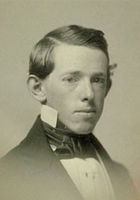Phoebe's Wooing Poem by Horatio Alger Jr
Phoebe's Wooing
'Phoebe! Phoebe! Where is the chit?
When I want her most she's out of the way.
Child, you're running a long account
Up, to be squared on Judgment-day.
'Where have you been? and what have you there?'
'To the pasture for buttercups wet with dew.'
'My patience! I think you are out of your wits;
I wonder what good will buttercups do?
'There's pennyroyal you might have got,-
It might have been useful to you or me,
But I never heard, in all my life,
Of buttercup cordial or buttercup tea.
'I want you to stay and mind the bread,
I've just put two loaves in the oven to bake;
When they are clone take them carefully out,
And put in their place this loaf of cake,
'While I run over to Widow Brown's;
Her son, from the mines, has just got back.
I don't believe he's a cent in his purse,
Young men are so shiftless now, alack!
'It was very different when I was young;
Young men were prudent, and girls were wise;
You wouldn't catch them gadding about
Like so many idle butterflies.'
So bustled and scolded the worthy dame,
Until she had passed the outer sill,
To do her justice, it seldom chanced
That her hands were idle, or tongue was still.
So Phoebe gathered her knitting up,
And sat her down in the chimney niche;
But her mind was on other thoughts intent,
And here and there she dropped a stitch.
The yellow kitten purred on the hearth,
While the kitchen clock, with its frame of oak,
In the corner stood, like a sentinel,
And challenged time with its measured stroke.
But Phoebe's mind was on none of these:
The bread in the oven, her good aunt's frown,
And the scene before her faded away,
And blended with thoughts of Reuben Brown:
How they walked together on summer days,
Or bravely faced the winter's chill,
And chatted merrily all the way
To the little school-house on Sligo Hill.
How both grew older, and school-days passed,
When he was a youth, and a maiden she;
How often she went with Reuben Brown
To the rustic dance or the social bee.
The warm flush deepened on Phoebe's cheek,
And she breathed a low, half-conscious sigh;
Ah, well-a-day! they were happy times,
But he has forgotten, and so must I.'
So Phoebe gathered her knitting up,
Which, while she was thinking, had fallen down,
When her quick ear caught a strange footfall,
And there in the doorway stood Reuben Brown,
With the same frank, handsome face she knew,
A smile as bright, and an eye as black-
'Phoebe,' he said, 'I have wandered far;
Are you glad to see your playmate back?'
The kitten still purred on the kitchen hearth,
And the ancient clock, with its frame of oak,
In the corner stood, like a sentinel,
And challenged time with its measured stroke.
A pleased light shone in the maiden's eyes;
Ah, love, young love, it is very sweet!
Reuben had gone, but she sat quite still,
And the knitting lay untouched at her feet.
Just then the dame came bustling in,
And went to the oven without ado.
'Why, Phoebe, child, what have you done?
The bread is baked as black as my shoe!'
And Phoebe started, and blushed for shame,
Took up her knitting and dropped it down;
And when her aunt said, 'What ails you, child?'
She hastily answered, 'Reuben Brown.'
Ah, love! young love! it is very sweet,
In field, or hamlet, or crowded mart;
But it burns with the brightest, purest flame
In the hidden depths of a young maid's heart.
This poem has not been translated into any other language yet.
I would like to translate this poem